
The Best TV Shows of 2021
I ended my intro to last year’s list with a simple “we’ll get there” after talking about how hard it was to watch people breathe in each other’s faces in 2020’s best TV shows. I’m disappointed to announce, though certainly no one needs my official word on the subject, that we are not there yet.
Nonetheless, even if 2021 ended with our having to once again (maybe?) stay anchored to our homes by our couches, we could be doing a lot worse than this year’s TV offerings. As a storytelling medium, television is populist. You tell a story on TV and an incredibly large number of people can easily access it. As studios figured out the best practices regarding COVID protocols, they freed themselves up to tell their stories at a normal click, more or less. There’s something sweet about our relentless drive to tell each other stories and something sweeter about our drive to continue to do it when times are terrible. Maybe especially when times are terrible. Here’s to less terrible times and even better stories.
– Sara Clemens, Curator
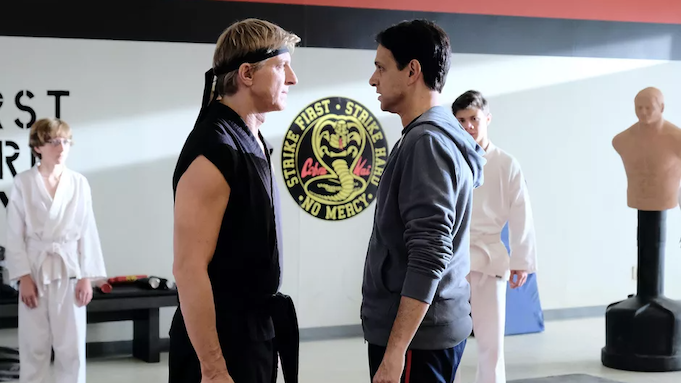
Cobra Kai
TV wasn’t my main coping mechanism through the first year of the pandemic, but Ducktales was super important for getting through the start of it and, when vaccines appeared on the horizon early this year, Cobra Kai helped lift the Horvath household spirits through those last several weeks of not leaving the house.
Cobra Kai is gloriously dumb. I generally prefer serious stories, but serious stories are everywhere on the boob tube these days. High quality dumb stuff like Cobra Kai is increasingly rare, especially because, plot twist, Cobra Kai is so smart in its dumbness. Yes, the characters are all boneheaded and frustrating (even Mrs. LaRusso, once the voice of reason, was ignored so completely that her only recourse was to succumb to her own brand of idiocy). Yes, the more adults get involved, the more likely a full-blown Karate war becomes. But also, yes, I very much want to see the Valley embroiled in a full-blown Karate war in which everyone learns valuable lessons about themselves at the end of day. It is stupid. It is infectious. It is exactly what we need. I can not wait for Season 4 to drop.
– Stu Horvath
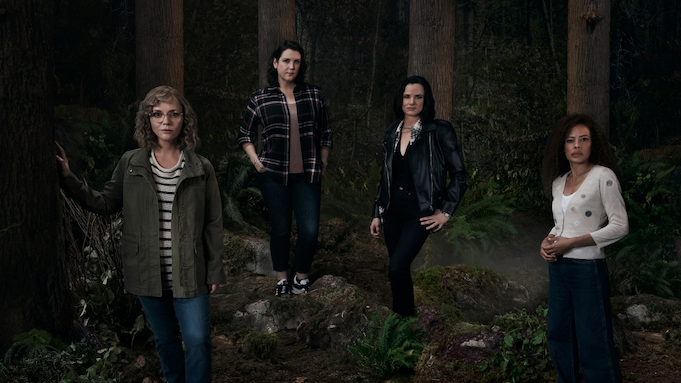
Yellowjackets
As a premise, “what if Lord of the Flies but girls” is not all that original, but far be it from me to ignore a show starring Christina Ricci, Juliette Lewis, Tawny Cypress, and Melanie Lynskey. One of those actors alone would be enough to get me to tune in, but all four? That’s appointment television.
A series focusing on a high-school soccer team surviving a plane crash in the wilderness and learning to survive the elements, each other, and (possibly) supernatural entities could easily be dismissed as a Lost clone, but Yellowjackets has a much better grasp on the balance needed to keep viewers coming back without losing all patience. Mysteries are well and good (and abound) but any series worth its salt knows the bread and butter is in exquisitely focused character work. The show jumps between the 1996 crash and the present-day survivors living with their ongoing trauma, giving plenty of room to both groups to focus on friendships broken and mended, rivalries stoked and romances nourished. The four adult actors are at the top of their game and their younger counterparts are well on their way to coming into their own. And that’s to say nothing about the sweet, sweet 90s needle-drops.
– Sara Clemens
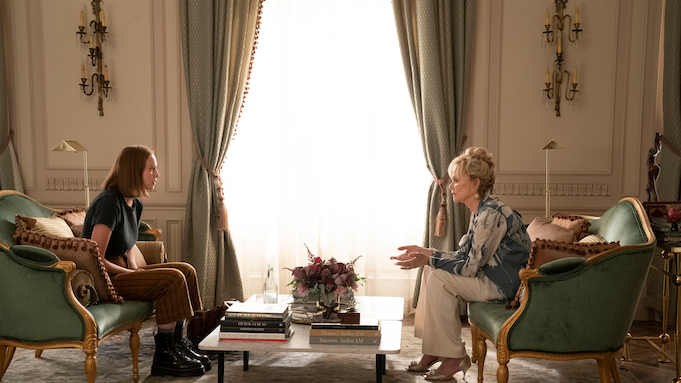
Hacks
Hacks is a grand play of even grander personalities, full to the brim with attitude and overflowing with emotion. It follows our young anti-heroine Ava Daniels played to whiny millennial perfection by Hannah Einbinder, and explores what occurs when her unsteady yearning comes smashing into Jean Smart’s Deborah Vance, a case-study in hard won, if brittle, confidence, covered in a lifetime of cigarette burns and grabby male hands.
Explosions and hijinks ensue, but also a ton of warm and emotionally compelling moments. Both women are just trying to be seen and accepted at the end of the day, even as they defensively hide their mutual insecurities. Their messy, fucked up path to friendship remains a touching arc because we all know what it means to want closeness and companionship without having the confidence to leave our ugly parts on display.
– Yussef Cole

Thousand Autumns
I could tell you that Thousand Autumns is a beautiful story about a person finding his way in the world after being betrayed by those nearest and dearest to him. I could tell you it’s a detailed wuxia narrative with rich lore, extensive historical details and figures from periods of Chinese history alongside gorgeously choreographed fights and martial art techniques. I could tell you the music, particularly the second opening, is fantastically composed. And all of that would be true. However, none of the above sold me on this series. What finally hooked me was the core story at the heart of Thousand Autumns, which is that this is the tale of a nefarious theater gay who is (lovingly?) stalking a former cultivation sect leader, who himself is trying his darnedest to stay on the righteous and upright path while somehow amassing a higher body count than anyone else in the show. The pacing is good, the humor and heartbreak is real, and we’ve officially gotten confirmation on a second season. You can watch the series on Tencent’s Youtube channel, and I highly encourage you to do so.
– Gingy Gibson
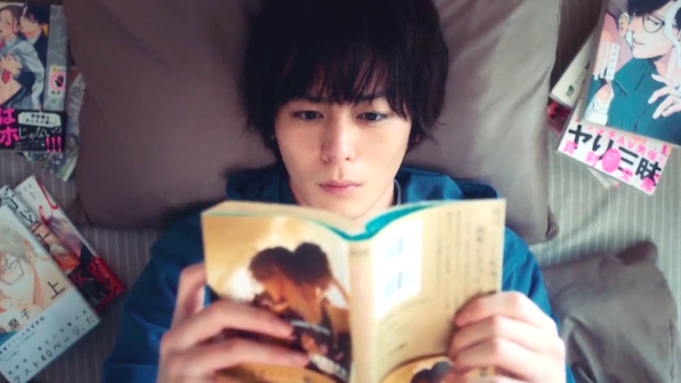
Absolute BL
What if you’re in a world of BL – a world where weird situations result in finding the love of your life, where a walk home could be a chance encounter – but you have no interest in being in a relationship. This is the case with Mob, the main character of Absolute BL who spends the entirety of the series attempting to navigate his way out of meet-cutes and instead manages to embody a very specific type of protagonist.
– Amanda Hudgins
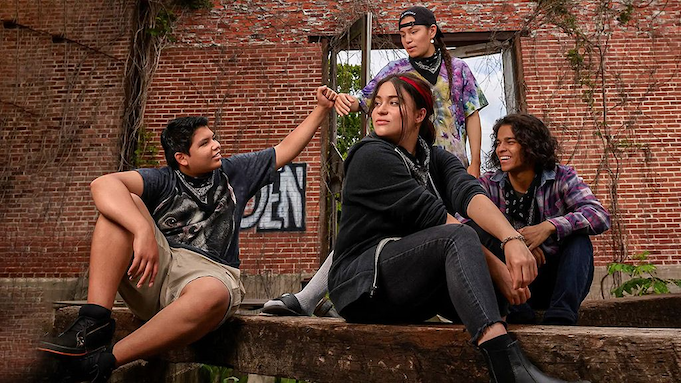
Reservation Dogs
Atlanta is one of those shows I respect more than genuinely like. It’s surreal, well-produced, and there’s nothing else quite like it, but at times it is a little too “out there” for its own good. Reservation Dogs on the other hand… it’s also an FX show, and it also deals with poverty a la “small town malaise” from the perspective of people of color. Dogs, however, feels a bit more grounded in just the right way. The humor is more accessible (but can still bite when it wants to), it takes more time with its characters and goes deeper with them, and it does so while incorporating Native American mythology into its modern setting (like the Deer Lady, who in the 21st century has a “thing” for pricks with muscle cars).
I think the aspect that really sets it apart though is that while Atlanta can at times feel like a massive sketch-show with continuity, Reservation Dogs feels more like a “normal” show. Its central group of teenagers go through embarrassment and pain in equal measure, they reflect on their place in the world, and although they spend a lot of their time trying to get one up on someone, they do realize how small their attempts to get ahead really are and settle for what really matters in their lives, as unimpressive as it may be. All of that, though, is what made Reservation Dogs one of the most subtly impressive shows of the year.
– Evan Dennis
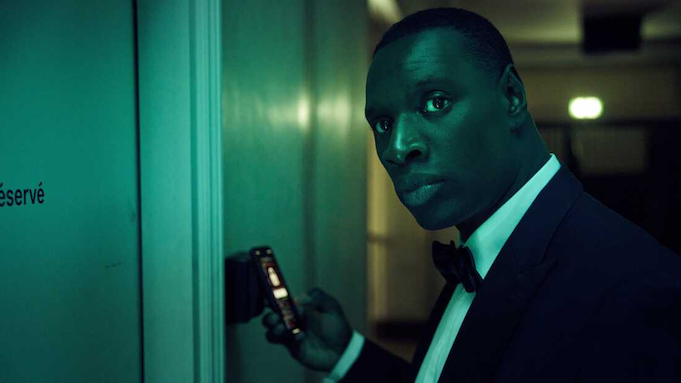
Lupin
Halfway through Lupin, there is a cliffhanger. Assane Diop (our hero and devoted fan of gentleman thief Arsène Lupin) brings his family to a gathering of fellow French book dorks. A hitman sent by Diop’s adversary and chief target, the perfidious Hubert Pellegrini, has followed them. Diop assures his family that everything has been taken care of, and maybe he even believes that to be true, but then the hitman kidnaps his son. Cue the mid-season break. After a string of capers with clever costumes and elaborate plans, including a heist from the Louvre, a break-in-and-out of prison, and the kidnapping of a Parisian police commissioner, it appears that Diop’s chickens have come to roost. I wasn’t sure if the show was going to pull off that change in tone.
And then, Lupin shifted gears spectacularly. While the first few episodes had overarching ties, they were somewhat self-contained. Character, backstory, and motivation were established amidst breaking, entering, pickpocketing, and magician’s patter. The second half of the show narrows its focus as Diop’s identity and target become known to all of France. How can the gentleman thief get his revenge when everyone knows him and the identity of his target?
With style, like everything else.
– Don Everhart

Only Murders in the Building
Only Murders in the Building doesn’t look or sound like the type of TV show I’d usually check out. I don’t care about true crime or murder mysteries, I’m almost never watching what’s most hyped at a given moment, and 90% of what I watch on TV at all is either 1) live sports or 2) starting the same two or three shows over again because I got halfway through a season six months ago and can’t remember what happened.
In short, I’m an extremely poor television critic.
Yet something about this show grabbed me anyway and kept me hooked. It tells the story of three strangers (washed up actor Charles played by Steve Martin, cash-strapped director Oliver played by Marin Short, and unassuming Mabel played by Selena Gomez) who are brought together by the gruesome death of neighbor Tim Kono in their upper-class New York City apartment building.
United by a love of true crime and a motivation to discover who could have killed Kono (even when no one else suspects murder), the trio teams up to crack the case before the clock runs out. All three deliver masterful performances, with each episode adding more twists and turns, as their own interpersonal dynamics develop more layers of deceit.
Only Murders in the Building updates the classic murder mystery formula for a true crime podcast-obsessed era and manages to make tired tropes feel fresh through sheer force of will and excellence in execution. Add it to your watchlist now if you haven’t already.
– Ben Sailer
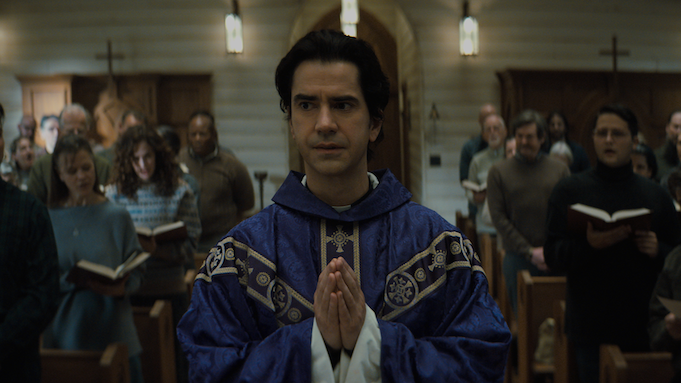
Midnight Mass
Not far off the Pacific Northwest coast of America lies a stretch of ocean known as the Graveyard of the Pacific. On one fateful evening on the 22nd of January 1906, the SS Valencia would strike a reef there near Cape Beale, Vancouver Island.
Though it’s never stated, Midnight Mass‘ Crockett Island has an otherworldly location. While filmed about 100 miles from the wreck of the Valencia in Vancouver, Crockett Island simultaneously feels like it could both be somewhere in New England or buried in the Pacific Northwest. It, like much else in Midnight Mass, feels as though it does not belong precisely where it is. A deeply Catholic, insular, island community beset by hard times and now somewhere out at sea. Lonely, isolated and soon to be full of terrors.
Midnight Mass is a television requiem. It is an elegy for the faithful who have lapsed, departed, and contemplated return to the community they’d long lost touch with. But in that moment of doubt there will always lie a subtle shard, the knowledge that in the end, no return can be without the knowledge that for some important, defining reason, one left.
Midnight Mass spends little time going from mysterious and contemplative to deep and overt demagoguery and monstrosity. The arrival of the priest who is more than he seems. His scary box that he brings with him. The secrets that will soon consume the town, literally. The show races towards its destructive finale. Characters breathe, grow, develop and let themselves become known to us before the final sunrise. For a tale that threatens the livelihood of the world, it is one that is surprisingly small – tight-knit, even.
After the Valencia struck the reef it would not immediately be the end. Less than 100 yards from the shore, many attempted to find help, few would succeed. The strength of the weather that drove them astray of their destination also prevented rescue. Some even refused initial rescue, certain that more help would be on the way. Ultimately, only 37 survived. The official death toll stands at 136, all of whom are believed to have been killed by drowning, being beaten against the rocks, or swept out to sea.
And so, like the Valencia, in their final moments the faithful of Crockett Island come together and sing. Perhaps hoping, this time no longer misguided, to be brought nearer to their god.
– David Shimomura
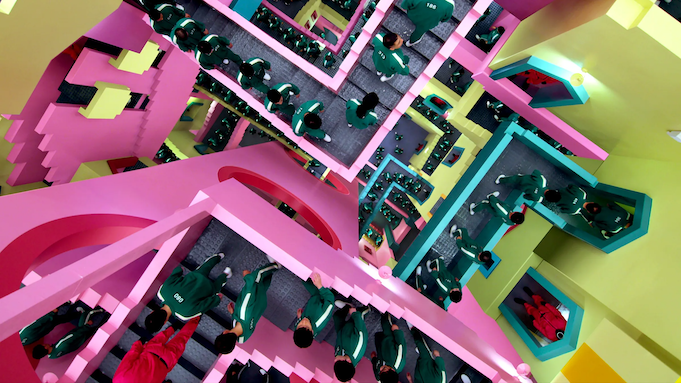
Squid Game
Popularity has never completely eluded the tastes of the anticapitalists of Unwinnable’s staff, but that Squid Game, which released only in September, is the most watched show of all time on Netflix and our highest ranked show of the year is worth pause. Because unlike the blockbusters developed by corporations with CIA partnerships or prestige miniseries from old names in Hollywood that have dominated popularity metrics for the past decade, Squid Game doesn’t rely on spoilers, spectacle, or nostalgia. It doesn’t adhere to the tenants of taste that have silently been written. Part of its success, as an international sensation and leftist art, is that its ironic premise, adults playing kid games to the death, is not the beginning of a farmhouse allegory. Rather, Squid Game shows the world how most of us already see it: the police are useless, healthcare is unaffordable, a middle manager doesn’t have to know what they’re doing, “fairness” is dictated by the whims of the wealthy – and all to the division of an entire class of people that cannot escape their economic or social position. Okay, there’s a little bit of metaphor. But while you can merchandise the show with Funko Pops and ad-delivery content (YouTube videos), I think what makes Squid Game our number one is that all attempts to defang Hwang Dong-hyuk’s commentary and further appropriate leftist art only reify its message. It’s a game the tastemakers and elite can’t win.
– Autumn Wright
Worth Mentioning
These are the gems that didn’t make it to the top ten but moved our writers to wax poetic or at least philosophic nonetheless.
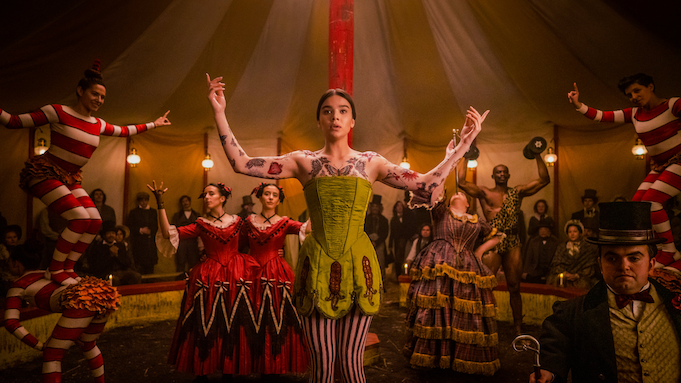
Dickinson
In my head I always pictured Emily Dickinson as just some agoraphobic spinster whose poems could all be sung to tune of the Pokémon theme song, so it took me some time to jump in to the Apple TV+ series despite my TV-critic bonafides (because who besides a TV critic has an Apple TV+ subscription anyway?). Fortunately I was hooked immediately and got to ride along with the show as it ended its run this year. (On a separate note, I appreciate Apple’s commitment to releasing episodes on a weekly basis. Not everything needs to be bingeable.)
Anachronistic period pieces are nothing new, but what I admire about Dickinson is the way it merged modern sounds and sensibilities with its historic storytelling in a way that made the characters feel overwhelmingly real. Rather than striving for cool-factor, those modern touches underscored the sameness between ourselves and these historical figures. People have always let loose and gossiped at parties, have always struggled with love and grief, have always chafed against the limitations society places on them, and have always, always sought to express themselves through art that would engender true connection with their fellows.
Over Christmas my poet sister-in-law told me she doesn’t much like Emily Dickinson – she finds her work perhaps too philosophical. But hearing Hailee Steinfeld intone her words as they appear burning onscreen like electric wire sends the blood pumping hot to this secret poet’s heart. It’s pure emotion to me.
– Sara Clemens
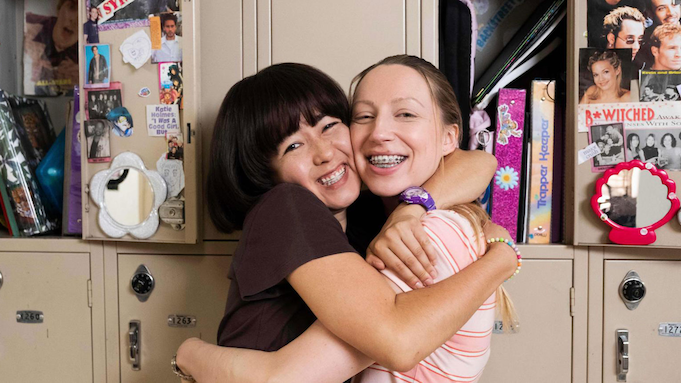
pen15
When I was 12 or 13, I switched schools, leaving my underfunded Bronx public school for a wealthy white private school in lower Manhattan. This was my first exposure to a lot of things, but primary in my memory sits the lavish bar and bat mitzvahs that many of my classmates wound up inviting me to. They were strange events, starting off with religious solemnity, only to be followed by lavish wedding reception grandiosity, crowded with 13-year-old Gatsbys running amok. Few things made me feel more like a stranger to this world, and so seeing Maya and Anna go through a similar experience in one of pen15’s final episodes felt both nostalgic and painful at once, like so many other moments the show has richly captured over its relatively short run.
Though the premise of the show (two fully grown adult women pretend to be kids alongside a cast of actual children) might sound bizarre, pen15 quickly begins to make sense as the two women shamble down period-perfect school halls in their headgear and ill-fitting clothing. After all, that age was all about feeling uncanny, unsure of your own body and your place in the world. pen15 has always been impressively adept at capturing that energy and turning it into side-splitting comedy. Watching its many relatable stories reliably brings me back to the strangeness and smallness of being a child, thrown into the churning waters of school, required to grow up and absorb all the awkwardness and pain without complaint.
pen15 has always worked because it wears its earnestness proudly on the sleeve of its mauve Gap turtleneck, and it’s an earnestness I will miss, now that the show has finally wrapped.
– Yussef Cole

Disenchantment
Disenchantment is three seasons deep as of 2021, with a fourth part on the way. I adore this series because it embraces allowing all of its characters to grow, for better or worse. Part 3 of Disenchantment saw Bean navigate the retro-future world of Steamland, question her own sexuality, and have to make the difficult decisions all adults must deal with when their parents are no longer able to care for themselves. Elfo continues to become disillusioned with the world (as he always wished), while Luci had to face the consequences of his Part 2 sacrifice to save his friends. Dagmar’s back, the elves search for something beneath Dreamland, and the weird sex cult continues to have their scheduled underground orgies. There are so many subplots to follow, and it’s genuinely enjoyable to do so. All of the characters have their own story and struggles, and it’s always fun to watch a new episode because you never know if this is the episode Odval fully seizes power for himself, or if Bunty will finally lead the revolution to bring down the monarchy (which I am seriously holding out hope for come Part 4). It’s a fun ride focusing on people just trying to make their way in the world, and I’ve loved every minute of it.
– Gingy Gibson
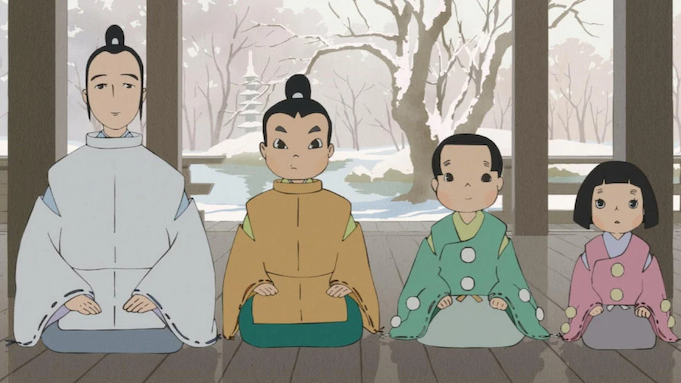
The Heike Story
From the visionary trio of A Silent Voice and Liz and the Bluebird – director Naoko Yamada, composer Kensuke Ushio, and screenwriter Reiko Yoshida – comes The Heike Story, a uniquely beautiful anime with a compelling, if dense, narrative. An adaptation of Japanese novelist Hideo Furakawa’s 2016 translation of The Tale of the Heike, Yamada’s The Heike Story is a subversive retelling of the historical epic akin to Caroline Miller’s or CS Lewis’s Greek myth. It relies on knowing how the story has been told, how it reflects and shapes culture, to interrogate and subvert gender, power, and mythmaking. Which is to say that a major function of the series is opaque to a general Western audience. But it is worth reading into still. Having departed from Kyoto Animation, Yamada and co. join Masaaki Yuasa’s studio Science SARU to bring its striking character designs and art style evocative of period-appropriate screens into motion in such a way that we expect only of prestige film. And hallmarks of Yamada are ever-present still. You can see her in the pacing, flower language, emotive feet, her fascination with girlhood, the subtle queer coding. It’s a delicate, unfolding anime that possessed my attention not unlike the bright leaves of an orchard in the winter.
– Autumn Wright
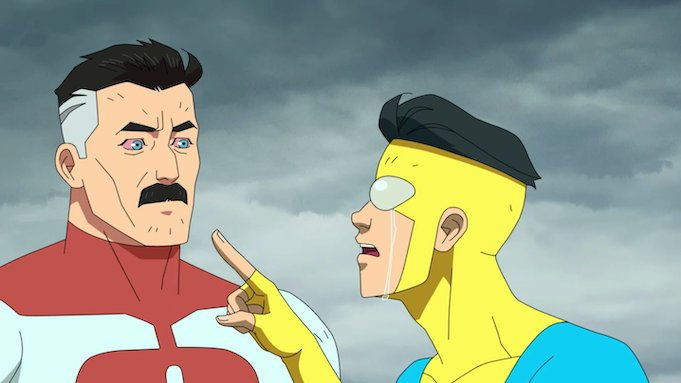
Invincible
At the center of Invincible are its two lead supermen: Mark Grayson and his father Nolan. The show might be an amalgamation of various DC and Marvel characters, but these two represent the two conflicting interpretations of Superman. Nolan, the elder “Omni-man,” is the Superman who’s viewed as un-relatable due to his invincibility, his power, and being a literal alien. Mark, on the other hand, is closer to the original idea of who Clark Kent was supposed to be: someone who uses his power for good, to help others and improve the world because that’s how he was raised. He might only be half-human, but he still had one normal parent and plenty of healthy friendships. Thanks to those attachments, he’s a world apart from his broken, murderous sociopath of a father.
Amazon Prime’s other big bloody superhero series The Boys is a bit more on the nose of how much it wants to evoke and subvert Zack Snyder’s take on superheroes, but Invincible feels like more of a full-throated rebuke and successful deconstruction. It’s a vast improvement on its source material, has a ton of great humor, and capital B brutal action scenes. It’s quite possibly the best superhero series currently airing, which is no small feat given the onslaught of Disney+ and CW shows.
– Evan Dennis
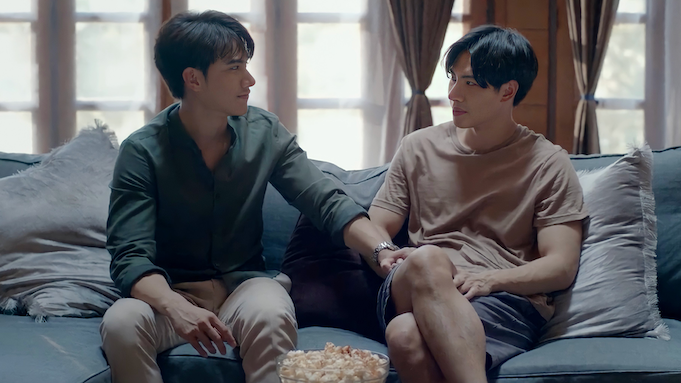
Manner of Death
It’s a murder mystery, it’s fun, it’s hella gay. Watch it.
– Gingy Gibson




